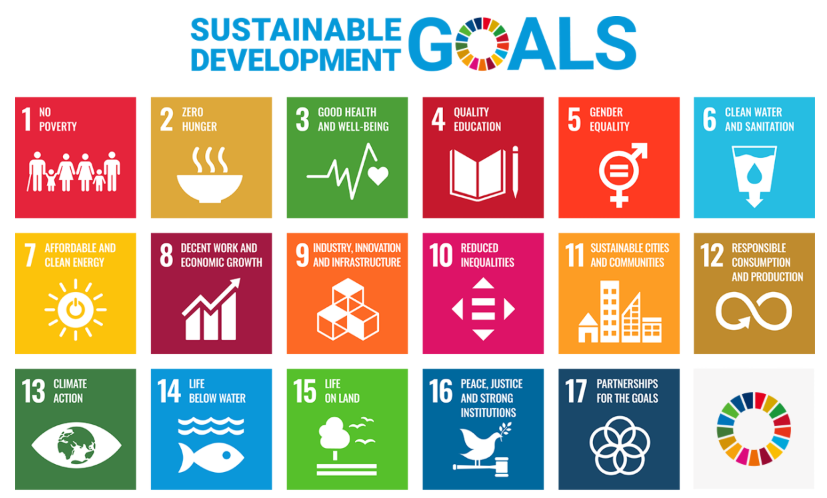5.1: Corporate Social Responsibility (CSR) and the UN’s Sustainable Development Goals (SDGs)
Corporate Social Responsibility (CSR)
Corporate social responsibility is a business model by which companies make a concerted effort to operate in ways that enhance rather than degrade society and the environment. CSR can help improve society and promote a positive brand image for companies. It refers to the approach that an organization takes in balancing its responsibilities toward different stakeholders when making legal, economic, ethical, and social decisions. CSR includes four categories: environmental impacts, ethical responsibility, philanthropic endeavours, and financial responsibilities.[1]
What motivates companies to be “socially responsible”? We hope it’s because they want to do the right thing, and for many companies, “doing the right thing” is a key motivator. The fact is, it’s often hard to figure out what the “right thing” is: what’s “right” for one group of stakeholders isn’t necessarily “right” for another. One thing, however, is certain: companies today are held to higher standards than ever before. Consumers and other groups consider not only the quality and price of a company’s products but also its character. If too many groups see a company as a poor corporate citizen, it will have a harder time attracting qualified employees, finding investors, and selling its products. Good corporate citizens, by contrast, are more successful in all these areas.
Sustainable Development Goals
The United Nations’ Sustainable Development Goals (SDGs) are a set of 17 goals that aim to achieve peace and prosperity for the people and the planet. In September 2015, all of the United Nations Member States adopted a “shared blueprint for peace and prosperity for people and the planet, now and into the future”. The 17 Sustainable Development Goals (SDGs) shown in Figure 5.1 are “an urgent call for action by all countries” — developed and developing — in a global partnership. They recognize that ending poverty must go hand-in-hand with strategies that build economic growth, and address a range of social needs, including education, health, equality and job opportunities, while tackling climate change and working to preserve our oceans and forests.[2]

The SDGs are as follows:
- No poverty
- Zero hunger
- Good health and well-being
- Quality education
- Gender equality
- Clean water and sanitation
- Affordable and clean energy
- Decent work and economic growth
- Industry, innovation, and infrastructure
- Reduced inequalities
- Sustainable cities and communities
- Responsible consumption and production
- Climate action
- Life below water
- Life on land
- Peace, justice, and strong institutions
- Partnerships for the goals
The 17 SDGs contain targets for building a better world for the people and the planet by 2030. Businesses, non-profits, NGOs, and educational institutions have developed their own frameworks to address the SDGs and meet individual targets. Sustainable development can be part of a company’s corporate social responsibility program.
On September 14, 2022, Patagonia’s founder, Yvon Chouinard, announced that he was transferring ownership of the company, valued at $3 billion, to a trust and nonprofit dedicated to fighting climate change. Rather than selling the company or going public, Chouinard ensured that all profits (about $100 million annually) would be used to combat environmental issues. This is an example of how a business such as Patagonia enabled progress on these SDG goals, serving to benefit society while reinforcing its brand and long-term mission. [3]
The Principles for Responsible Management Education (PRME)
The Principles for Responsible Management Education (PRME) is a United Nations-supported initiative established in 2007 to integrate sustainability into business and management education. Built on Seven Principles, PRME encourages academic institutions to equip future leaders with the skills to balance economic, environmental, and social goals while advancing the SDGs.
The UN Global Compact is the world’s largest corporate sustainability initiative, calling on businesses to align their strategies with universal principles on human rights, labour, the environment, and anti-corruption. Aligned with the UN Global Compact, PRME’s vision is to drive a global movement for responsible management education, while its mission is to transform business education and develop decision-makers who contribute to sustainable development. [4] As the largest organized relationship between the UN and management education, PRME has over 800 signatory institutions worldwide committed to responsible leadership. Since becoming a signatory in 2020, Conestoga College, School of Business has worked to embed the PRME Principles and SDGs across the School and, as of 2024, has won three awards for its reporting and engagement. Check out the School’s Sharing Information on Progress Reports to learn more.
Attribution: © Anna Hohenadel, Accreditation Consultant, Conestoga College. Used under a Creative Commons Attribution – Non-commercial Share Alike License.
Media Attributions
Figure 5.1: United Nations Sustainable Development Goals. © United Nations, All Rights Reserved. Used according to the SDG Guidelines AUG 2019 Final. The content of this publication has not been approved by the United Nations and does not reflect the views of the United Nations or its officials or Member States.
- Fernando, J. (2024, March 6). What is CSR? Corporate social responsibility explained. Investopedia. ↵
- United Nations (n.d.). Sustainable development goals (SDGs). ↵
- Chouinard, Y. (n.d.). Earth is now our only shareholder. Patagonia. ↵
- PRME. (n.d.). About PRME. ↵
A business model by which companies make a concerted effort to operate in ways that enhance rather than degrade society and the environment.
A set of 17 goals set out by the United Nations that aim to achieve peace and prosperity for people and the planet.

